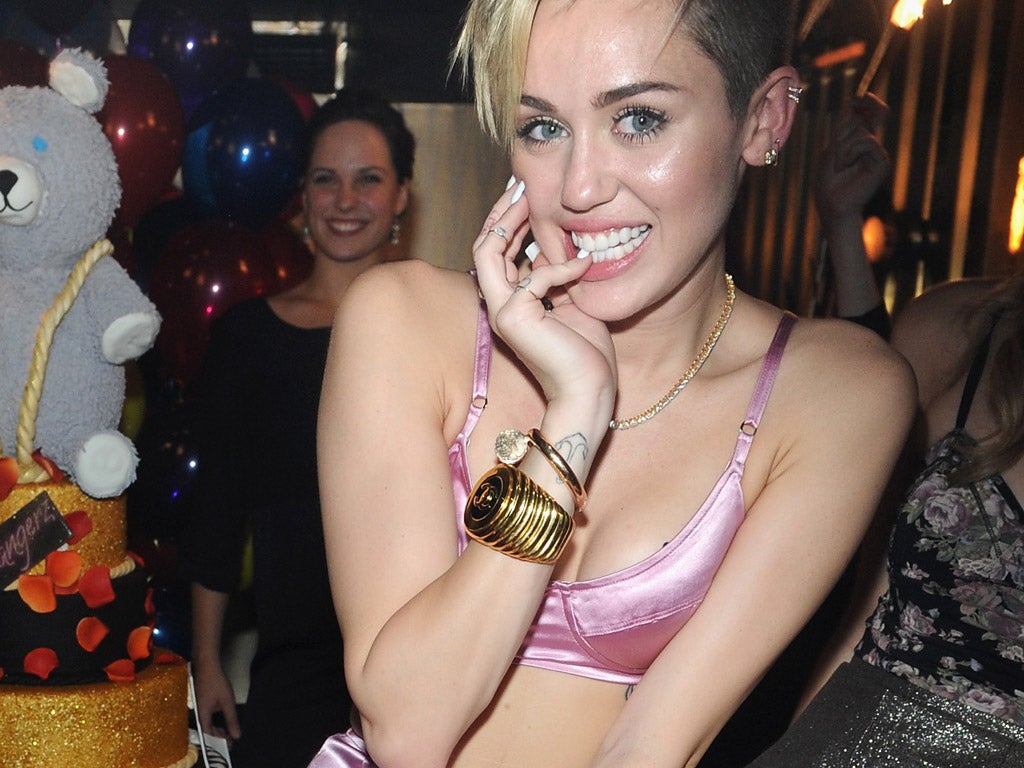Miley Cyrus reaches number one: Where are all the middle-aged men in this debate?
For as long as there has been pop music there have been scandalised parents

Was it Miley Cyrus’s giant foam finger which first pointed the way to the sexualisation of pop music? Or have we, in fact, been having this conversation since long before the 20-year-old was a twinkle in Billy Ray Cyrus’s eye? Depending on who you want to believe, the dawn of sexy music can be traced back to Madonna’s conical bra in the Nineties, Jimi Henrix’s underpants in the Seventies or Elvis’s proto-twerk on the The Ed Sullivan Show in the Fifties. For as long as there has been pop music parents have been scandalised to contemplate the corruption of teenagers’ morals.
What’s new is how the debate has narrowed to focus specifically on young female artists. Sinead O’Connor made her thoughts known in an open letter, Annie Lennox weighed in via Facebook and this Monday Charlotte Church, child star, turned pop star, turned cultural commentator, added her eloquent voice to the debate. In a speech broadcast on Radio 6 Music, she bemoaned the way “[female pop stars] are encouraged to present themselves as hyper-sexualised,” and added that “The culture of demeaning women in pop music is so ingrained as to become routine.”
I never thought I’d say the words, but you know who’s really missing from this debate? Powerful, middle-aged white men. The older women have spoken. The younger women have responded by sending Cyrus to the top of the album and singles charts. Meanwhile who, specifically, are these “spunk-spewing dirtbags” and “greedy record company executives” that O’Connor referred to, and what do they have to say for themselves? No doubt there are legal issues which prevent naming names, but I’d suggest it’s also difficult to single out individuals for blame when the issue is so pervasive.
If sexualised pop music is an old one, the issue of women being valued according to their sexual appeal is even older and it’s not confined to the music industry. It’s evident in fashion, in advertising, in politics and sports. Can the weight of all that really be borne by Rihanna’s particularly flimsy knicker elastic?
Church blamed “the videos of the nineties” for Rihanna’s noted tendency “to portray her sexuality so luridly, so constantly, and so influentially” I grew up watching those videos too and I recall the rise of the “viddy-ho”, but I also remember artists like TLC, Salt n Pepa and Missy Elliot, who performed in dungarees or tracksuits (as well as crop tops) and who wrote songs about unrealistic beauty standards and financial independence (as well as sex).
There are still lots of great female artists who foreground music over sex appeal and many of them, we should note, are the victims of online misogyny, regardless. Your teenage daughter will be able to name a few and if she can’t, consider this: Maybe it’s not the smut we need to save them from, maybe it’s their God-awful taste in music.
Twitter: MsEllenEJones
Join our commenting forum
Join thought-provoking conversations, follow other Independent readers and see their replies
Comments
Bookmark popover
Removed from bookmarks